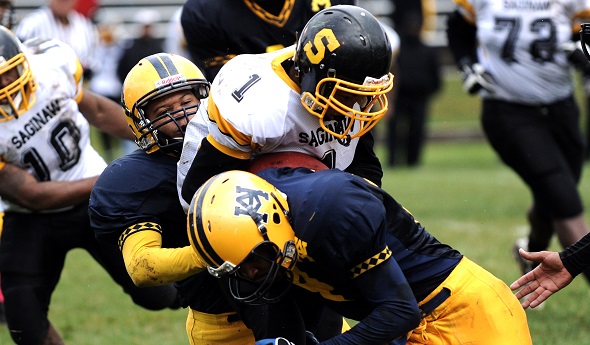
#TBT: End of an Era in Saginaw
October 23, 2014
By Geoff Kimmerly
Second Half editor
Michigan will wave farewell this weekend to one of its longest-running high school football rivalries as Saginaw High and Arthur Hill play one last time before one of the schools is closed in December.
The 120-year-old rivalry is tied for second-oldest in Michigan history, ranks third with 128 games played and first among rivalries between Lower Peninsula schools.
The Saginaw News reported last month that the district’s Board of Education will vote on which to close in December after voting in July to shut down one of the two.
The schools – first called simply West Side and East Side – have met annually dating to 1894, save for four years – including in 1897 when it was deemed too large a mismatch and 1910 because of a smallpox outbreak. That fall marked the last the two didn’t play at least once – they played each other twice in 1895 and 1974.
Arthur Hill owns a 58-49 advantage in the series, and the teams tied 11 times. The Lumberjacks won last season’s Week 9 tilt, 43-22, but Saginaw holds a 12-8 edge over the last two decades.
Saginaw won the 1999 MHSAA Division 2 championship under coach Donald Durrett, while Arthur Hill claimed the Class AA title in 1991 under coach Jim Eurick and finished runner-up in 1992 – winning the 1991 game over Detroit Catholic Central 13-12 before losing to DCC in the following year's championship game rematch 21-20.
Sadly, both are finishing on softer notes; Saginaw has lost 16 straight games since winning on opening night 2013, while Arthur Hill has lost 13 of its last 14 with that lone win in between coming against the Trojans last fall.
Click to read select pages from the 1994 game program, itself a history book recalling a proud era in Saginaw history.
PHOTO: Arthur Hill defeated Saginaw 43-22 in last season's meeting between the longtime rivals. (Click to see more from HighSchoolSportsScene.com.)
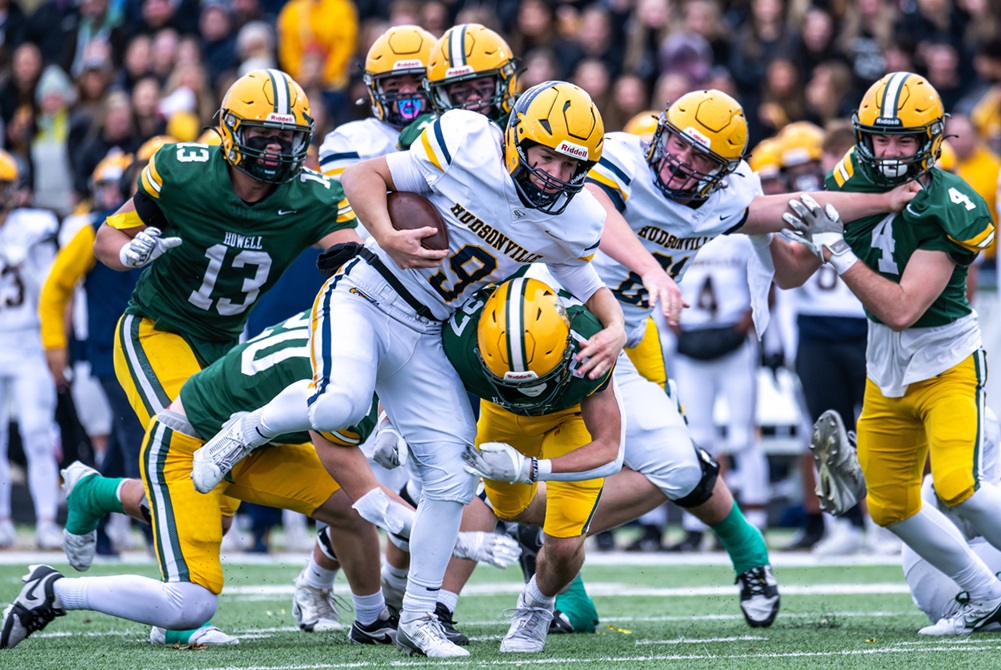
1st & Goal: 2024 Playoffs Week 3 Review
By
Geoff Kimmerly
MHSAA.com senior editor
November 18, 2024
We’ve rounded the final turn toward the finish of this 2024 football season.
 All four 8-player finalists are decided, and we lead off today’s “Review” with a look back and how they earned their trips this weekend to Northern Michigan University’s Superior Dome.
All four 8-player finalists are decided, and we lead off today’s “Review” with a look back and how they earned their trips this weekend to Northern Michigan University’s Superior Dome.
We also glanced at all 32 Regional Finals in the 11-player bracket as those winners pulled within one more victory of booking Thanksgiving weekend at Ford Field.
8-Player Division 1
HEADLINER Pickford 34, Indian River Inland Lakes 18 This proved to be Pickford’s closest game so far this season, but the Panthers (12-0) advanced to their first MHSAA Final since 2019 when they won Division 1 – and also avenged a 12-0 Semifinal loss to Inland Lakes from a year ago. Pickford did so by holding the Bulldogs (11-1) well below its average of 53 points per game heading into the weekend. Click for more from WLUC.
HEADLINER Deckerville 49, Mendon 32 Mendon scored first and trailed by only three at halftime, but Deckerville outscored the Hornets 20-6 over the final two quarters. The Eagles (12-0) slowed down a Mendon rushing attack that hadn’t run into too many obstacles this season, and Deckerville quarterback Hunter Garza ran for 228 yards and three touchdowns and threw for two fourth-quarter scores. Click for more from the Huron Daily Tribune.
8-Player Division 2
HEADLINER Crystal Falls Forest Park 49, Onekama 24 The Trojans are headed back to the Finals for the first time since winning Division 2 in 2017. Forest Park put up more points than Onekama had given up in a game this season and held the Portagers (10-2) to eight fewer than their season average. Click for more from the Iron Mountain Daily News.
HEADLINER Morrice 36, Britton Deerfield 0 Morrice (11-1) dominated on both sides of the ball and with Wyatt Cartier finding the end zone from his positions on offense and defense, running for three scores and returning an interception for a fourth. The Patriots (10-2) were averaging 53 points per game entering the weekend. Click for more from the Lansing Herald.
11-Player Division 1
HEADLINER Detroit Catholic Central 35, Belleville 21 As anticipated, and evidenced by the sizable crowd filling the stands, this was a game many had hoped to see for some time – and they watched DCC (12-0) win its first Regional title since 2017 while ending the career of one of the most accomplished players in MHSAA football history. Belleville (10-2) finished a combined 50-4 with three trips to Ford Field and two Division 1 titles during quarterback Bryce Underwood’s four seasons on varsity. Click for more from the Oakland Press.
Big Performance from Samson Gash! 🚨💥
Check out the highlights of Detroit Catholic Central junior Samson Gash in their win over Belleville in the 2024 Division 1 Regional Final. Gash scored two touchdowns (1 rushing and 1 rushing) and he also made an interception on the… pic.twitter.com/GP622NSDYR
— STATE CHAMPS! Michigan (@statechampsmich) November 17, 2024
Regional Roundup Hudsonville 35 Howell 6 The Eagles (11-1) won their first Regional title since 2005 and ended Howell’s winningest season at 11-1, holding the Highlanders scoreless until the fourth quarter. Rochester Adams 21, Grand Blanc 14 Adams (10-2) improved to a combined 9-3 in the playoffs over the last four seasons by winning its first Regional title since 2021. Grand Blanc finished 9-3, its defeats by a combined 10 points. Detroit Cass Tech 21, Macomb Dakota 14 Alex Graham snagged the game-winning touchdown pass above two defenders with 19 seconds to play to lead Cass Tech (10-2) to its second Regional title in three seasons. Dakota finished 10-2.
11-Player Division 2
HEADLINER Birmingham Groves 21, Warren De La Salle Collegiate 19 Groves (12-0) took a seven-point lead into halftime and a one-point advantage into the fourth quarter on the way to claiming its second Regional title in three seasons. The Falcons’ victory also meant the end of De La Salle’s four-year streak of reaching Ford Field; the Pilots (8-3) were Division 2 runners-up a year ago. Click for more from the Detroit Free Press.
Regional Roundup Byron Center 52, Portage Central 14 Byron Center (11-1) won its first Regional championship and set a program record for wins, taking the next step after falling in a Regional Final last year. Portage Central finished 8-4 after winning its first District title since 2021. East Lansing 49, Saginaw Heritage 27 East Lansing (9-3) repeated as a Regional champion by scoring more points than Heritage (8-4) had given up in a game since Week 3 of the 2023 season. Orchard Lake St. Mary’s 27, Gibraltar Carlson 3 St. Mary’s (9-3) won its first Regional title since 2016, thanks in part to holding the Marauders (10-2) to 39 points below their average and single digits for the first time since 2022.
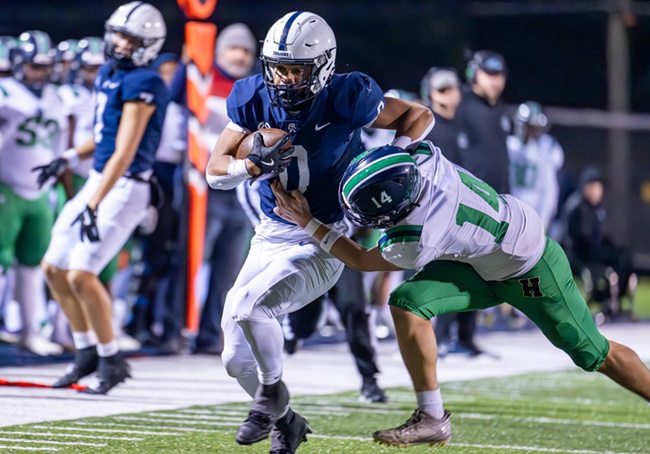
11-Player Division 3
HEADLINER Zeeland West 36, Grand Rapids Forest Hills Central 20 West (11-1) repeated as a Regional winner and this time ended the season for the reigning Division 3 champion, after having lost to FHC 18-14 in the Semifinal a year ago that sent the Rangers to Ford Field. The Dux also had won their regular-season meeting in Week 6, as FHC finished this fall 9-3. Click for more from the Grand Rapids Press.
Regional Roundup Mason 22, Walled Lake Western 17 After falling to Western 20-17 in Week 8, Mason (10-2) avenged to clinch its fourth-straight Regional title and end the Warriors season at 11-1. DeWitt 70, Petoskey 34 DeWitt (12-0) ended Petoskey’s longest playoff run since 2014 by tying its highest-scoring output this fall – and moving into a tie for eighth all-time for single-season scoring by an 11-player team, with 682 points. The Northmen finished 11-1. Detroit Martin Luther King 34, River Rouge 0 King (9-3) ran its Regional title streak to four with a fourth-straight season defeating Rouge during the playoffs since falling to the Panthers (6-5) in a 2020 Regional Final.
11-Player Division 4
HEADLINER Niles 37, Portland 34 Niles (11-1) not only avenged last season’s 21-14 loss to Portland in this round, but in doing so won its first Regional title and set a program record for wins for the second-straight season. Portland is a combined 43-7 over the last four after completing its fourth-straight double-digit finish at 11-1 as well. Click for more from the Niles Daily Star.
Niles vs. Portland.
Regional Championship rematch from 2023.
The Vikings get their revenge!
Niles beats Portland, 37-34, to be a regional champion for the first time ever! 🏆@NilesAthletics @scot_shawNHSfb @BennettTalen @SamRucker14 @Peyton642126111 @brendenolsen22 pic.twitter.com/33dOjkFS96
— Bennett Wise WSBT (@BennettWiseWSBT) November 16, 2024
Regional Roundup Grand Rapids South Christian 28, Whitehall 21 In another one-score Regional Final, Whitehall (8-4) came back to get within striking distance but fell to the Sailors in a Regional Final by this score for the second time in three seasons. South Christian (8-4) needs one more win to reach Ford Field for a third-straight year. Goodrich 42, Haslett 13 Goodrich (11-1) repeated in winning this Regional Final matchup from a year ago as well, controlling the line to run for five touchdowns and adding a sixth on a turnover. Haslett finished 8-4 after beginning 1-3, and with three losses this season to teams playing in Semifinals. Harper Woods 48, Macomb Lutheran North 3 The reigning champion is one win from returning to Ford Field, as Harper Woods (9-3) held Lutheran North to 30 points fewer than its season average. The Mustangs set a program record for wins in finishing 10-2.
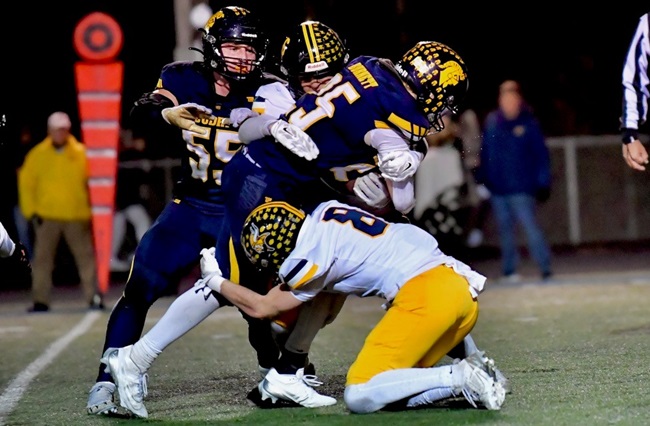
11-Player Division 5
HEADLINER Grand Rapids Catholic Central 21, Kalamazoo United 14 Dale Gant’s touchdown with 3:04 to play was the decider as Catholic Central (8-4) claimed a ninth-straight Regional title. United finished 9-3, with its highest win total since 2018 and two of those losses to opponents still playing. Click for more from Michigan Sports Radio.
Highlights of Grand Rapids Catholic Central's win over Kalamazoo United in the Division 5 Regional Final on November 15th, 2024
🎥 WOOD-TV | @MHSAA @GRCC_CougarsFB pic.twitter.com/Ciwm9QoviW
— STATE CHAMPS! Michigan (@statechampsmich) November 17, 2024
Regional Roundup Frankenmuth 35, Gladwin 0 The Eagles (12-0) added a second win over Gladwin (8-4) over the last four weeks to clinch a fifth-straight Regional championship. Pontiac Notre Dame Prep 45, Armada 19 In winning their first Regional title, the Fighting Irish (10-1) tied their school record for wins. Armada (10-2) also set a school record for wins this fall. Flat Rock 41, Ann Arbor Father Gabriel Richard 0 Flat Rock won a second-straight Regional title with its second shutout this season. FGR finished 7-5 after winning its first District title since 2012.
11-Player Division 6
HEADLINER Lansing Catholic 49, Newaygo 36 Lansing Catholic (9-3) is another team that has entered the spotlight these playoffs, with three wins over opponents that entered those matchups a combined 26-4. The Cougars took advantage of turnovers to get a quick jump this time and followed quarterback Alex Fernandez to their second Regional title in four seasons. Newaygo finished its winningest since 2012 at 9-3. Click for more from MLIVE.
Regional Roundup Boyne City 34, Reed City 21 Boyne City (10-2) rushed to its first Regional title since 2014 on the legs of Owen Hewitt, who scored four touchdowns. Reed City finished 9-3, reaching nine wins for the fifth-straight season. Jackson Lumen Christi 42, Constantine 6 Last season’s Division 7 champion is enjoying similar success in Division 6 as Lumen Christi (11-1) is seeking to make the Ford Field trip for the third-straight year. Constantine finished 8-4. Marine City 52, Detroit Central 26 Marine City (10-2) downed Central for the second time in four weeks after previously defeating the Trailblazers (8-4) in Week 9, 37-15. The Regional title was the Mariners’ second in four seasons.
11-Player Division 7
HEADLINER North Muskegon 23, Menominee 0 North Muskegon made the long drive to the western Upper Peninsula, which allowed additional time to celebrate one of the most notable wins in recent program history. The Norsemen (11-1) claimed their second-straight Regional title and avenged last year’s Semifinal loss to Menominee (10-2), which ended up finishing Division 7 runner-up. This time, North Muskegon shut down a Maroons offense that was averaging 45.5 points per game and put 32 on the Norsemen last season. Click for more from the Muskegon Chronicle.
Regional Roundup Millington 28, Pewamo-Westphalia Defense also was the story in this matchup, as the Cardinals (12-0) posted their fifth shutout this fall, holding the Pirates (9-3) without a point for the first time since 2012. Schoolcraft 28, Hudson 16 Schoolcraft (11-1) will play in the Semifinals for the first time since 2020 after taking the lead during the closing minute of the first half and holding off the Tigers (10-2) the rest of the way. Hudson entered the game giving up only 8.4 points per game and hadn’t allowed more than 17. Monroe St. Mary Catholic Central 55, Leslie 18 St. Mary (12-0) won its first Regional title since 2019 as it continued to surge offensively – the Falcons topped 50 points for the second time this season and also second week in a row. Leslie finished its first winning season since 2012 at 10-2, totaling one more win than the last three seasons combined.
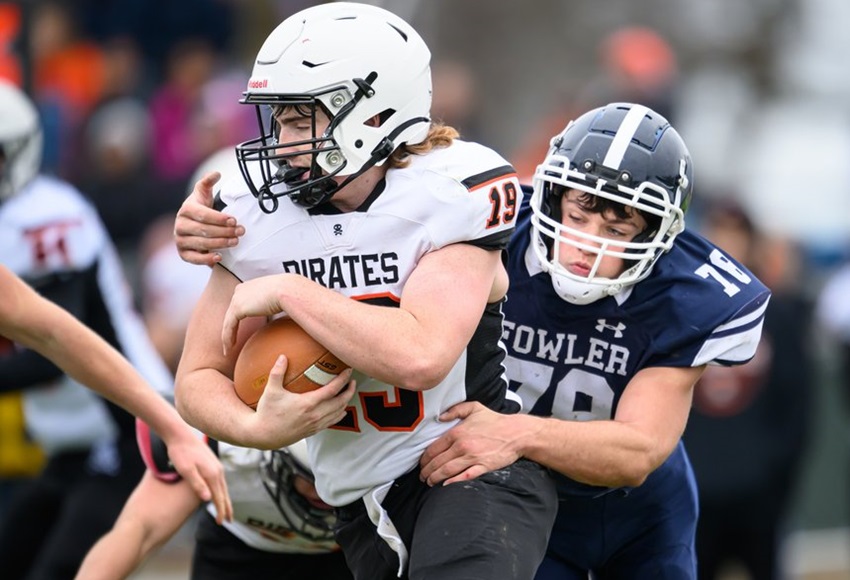
11-Player Division 8
HEADLINER Fowler 25, Harbor Beach 7 Fowler (12-0) has impressed all season and now will play in a Semifinal for the first time since 2019. But this might have been the Eagles’ best win so far this fall. Fowler held a Pirates offense averaging 44 points per game to a single score and put 25 points on a defense that was giving up just 5.5 ppg entering the weekend. Harbor Beach finished 11-1, its best since 2018. Click for more from the Lansing State Journal.
Regional Roundup Beal City 14, Iron Mountain 7 Beal City (10-2) also handed the lone loss of this season to its opponent, traveling to Iron Mountain to win its second-straight Regional title and third in four seasons. The Aggies also defeated the Mountaineers (11-1) in a 2023 Regional Final. Decatur 41, Reading 0 Decatur (11-1) claimed its first Regional title since 2002, continuing a tremendous improvement from 4-5 a year ago. The Raiders have given up only 13 points over three playoff games. Reading finished 7-5, also a considerable turnaround from 2-7 last fall. Riverview Gabriel Richard 30, Detroit Loyola 12 RGR (10-1) was another repeat Regional champion, and this time set a program record for wins in adding a second this fall over Loyola (5-7). The Pioneers also had defeated Loyola 29-8 in Week 5.
MHSAA.com's weekly “1st & Goal” previews and reviews are powered by MI Student Aid, a division within the Department of Lifelong Education, Advancement, and Potential (MiLEAP). MI Student Aid encourages students to pursue postsecondary education by providing access to student financial resources and information. MI Student Aid administers the state’s scholarship and grant programs that help make college Accessible, Affordable and Attainable for you. Click to connect with MI Student Aid and find more information on Facebook and Twitter @mistudentaid.
PHOTOS (Top) Hudsonville’s Bryce Fox (9) emerges from the grasp of multiple Howell defenders Saturday. (2) East Lansing’s Jace Clarizio (0) works to break the tackle of Saginaw Heritage’s Anthony Fries. (3) Goodrich’s Chase Burnett (25) takes on a pair of Haslett defenders. (4) Fowler’s Joe Epkey (78) wraps up a Harbor Beach ball carrier Saturday. (Top and East Lansing/Heritage photos by L.C. Arreguin/Team Arreguin Photos. Goodrich/Haslett photo by Terry Lyons. Fowler/Harbor Beach photo by Kolleth Photo.)

